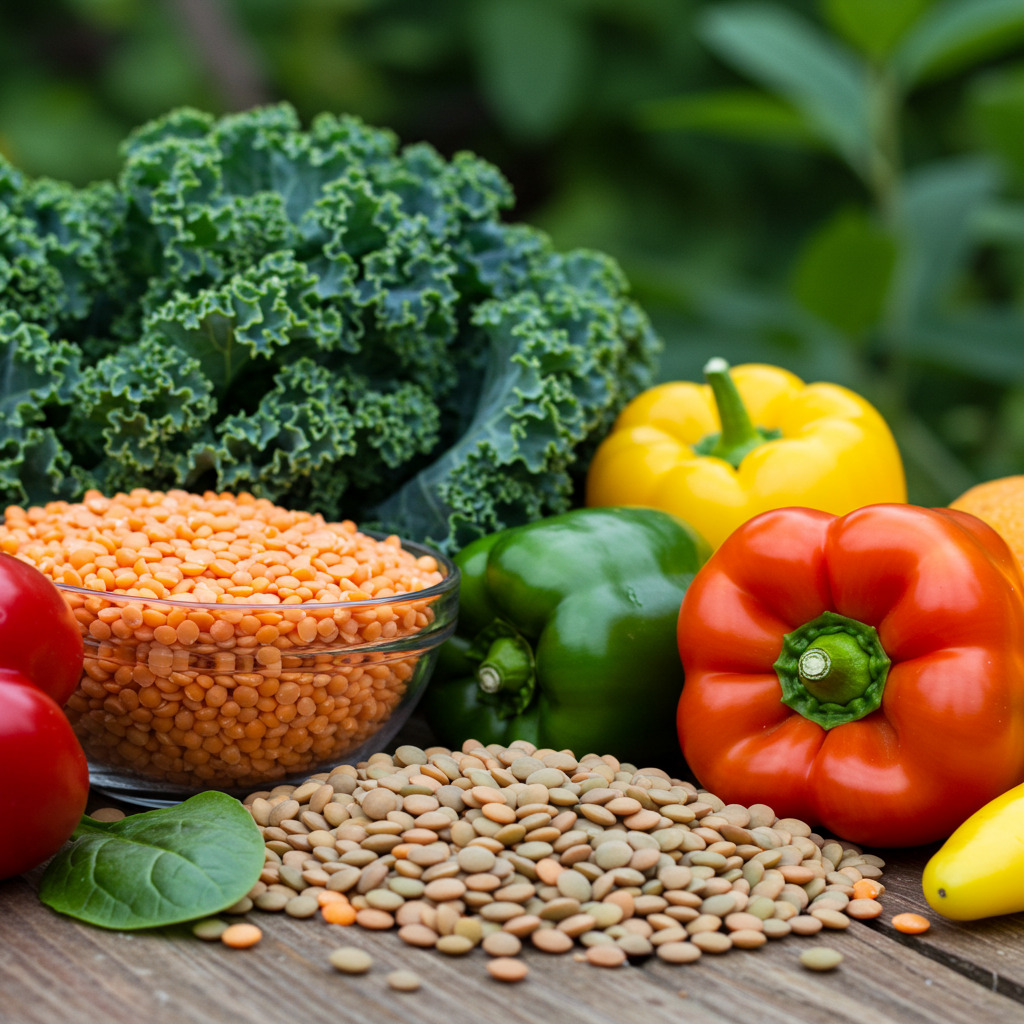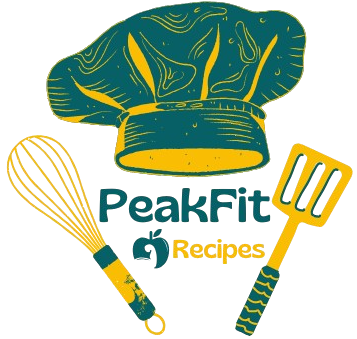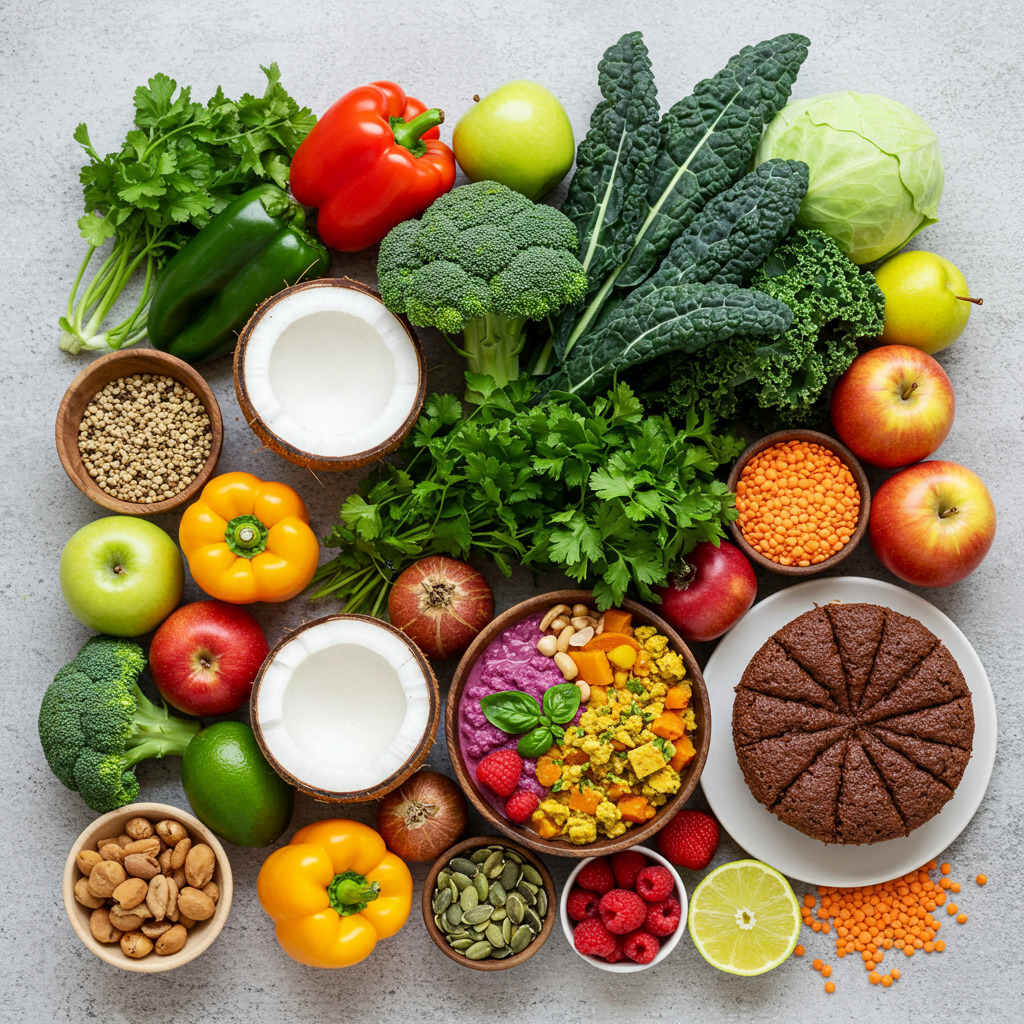Understanding the Naturally Vegan Diet
What Does Naturally Vegan Mean?
The term naturally vegan simply means a diet free of all animal products. This approach to eating excludes meat, dairy, eggs, and honey. Furthermore, it emphasizes whole, plant-based foods in their most natural state. This differs from processed vegan foods, which can sometimes be high in unhealthy fats and additives. Instead, a naturally vegan diet focuses on fruits, vegetables, grains, legumes, nuts, and seeds. Thus, it promotes both health and well-being.
Benefits of a Naturally Vegan Diet
- Improved Heart Health: Plant-based diets are typically lower in saturated fat and cholesterol. They also tend to be high in fiber, which can lower blood pressure and bad cholesterol levels. Naturally, this contributes to improved cardiovascular health.
- Weight Management: Many find it easier to maintain a healthy weight on a naturally vegan diet. Plant-based foods are generally lower in calories and higher in fiber, promoting satiety. Furthermore, the abundance of nutrients supports overall health and wellness.
- Better Digestion: The high fiber content in plant foods aids digestion and prevents constipation. This leads to a healthier gut and reduces the risk of digestive issues. Consequently, the gut microbiome can thrive from consuming whole plant foods.
- Reduced Risk of Type 2 Diabetes: Studies show that a naturally vegan diet can improve insulin sensitivity. This reduces the risk of developing type 2 diabetes. Additionally, many plant foods are rich in nutrients that support blood sugar control.
- Environmental Sustainability: Choosing a plant-based diet is more sustainable. It requires fewer resources and generates fewer greenhouse gas emissions than animal agriculture. Therefore, it is an excellent choice for those who want to reduce their environmental impact.
Naturally Vegan vs. Other Vegan Diets
It’s important to note that not all vegan diets are equal. Some may include highly processed vegan alternatives. These processed options can be high in unhealthy fats, sodium, and sugar. However, a naturally vegan approach prioritizes whole, unprocessed plant foods. As a result, it is typically healthier. Therefore, when adopting a vegan diet, choosing whole foods is key.
Core Components of a Naturally Vegan Diet
Fruits and Vegetables: A Cornerstone
Fruits and vegetables are the foundation of any healthy diet, and the naturally vegan approach is no exception. These foods are packed with essential vitamins, minerals, and antioxidants. They come in many colors, tastes, and textures, offering countless options for variety. Therefore, try incorporating a diverse selection of fruits and vegetables into your daily meals.
Grains: Whole and Unrefined
Whole grains like brown rice, quinoa, oats, and whole-wheat bread are excellent sources of carbohydrates. They also provide fiber and essential nutrients. However, it’s important to choose whole grains over refined options like white bread and pasta. This way, you’re maintaining the nutritional value, too. For instance, whole grains help to control blood sugar levels better than refined grains.
Legumes: Protein Powerhouses
Legumes, including beans, lentils, and chickpeas, are critical to a naturally vegan diet. They are excellent sources of protein and fiber. These foods are also rich in iron and other essential nutrients. They are versatile and can be used in many dishes. Therefore, incorporating a variety of legumes is vital for protein intake.
Nuts and Seeds: Healthy Fats
Nuts and seeds are full of healthy fats, protein, and fiber. They’re an important part of a naturally vegan diet, as these provide essential nutrients. Moreover, these include almonds, walnuts, chia seeds, flax seeds, and hemp seeds. Try to include a variety of nuts and seeds into your daily diet. Naturally, this will help keep you healthy.
Healthy Oils: Essential for Cooking
Using healthy oils such as olive oil, avocado oil, and coconut oil is important for cooking and salad dressings. These oils provide essential fatty acids and support the absorption of certain vitamins. However, use them in moderation, as they are high in calories. Additionally, they add flavor and texture to meals.
Naturally Vegan Protein Sources
Getting enough protein is often a concern for people considering a vegan diet. However, many plant-based foods are excellent sources of protein. These include legumes, tofu, tempeh, nuts, seeds, and whole grains. Therefore, a well-planned naturally vegan diet can easily meet your protein needs.
Foods to Include in Your Naturally Vegan Diet
The Variety of Vegetables
Include a wide array of vegetables. Dark leafy greens, colorful bell peppers, and cruciferous vegetables are all packed with nutrients. These should be a cornerstone of your diet. Naturally, they are low in calories and high in fiber, vitamins and minerals. Therefore, variety is key for overall health.
The Sweetness of Fruits
Fruits provide natural sweetness and essential nutrients. Berries, bananas, apples, and citrus fruits offer a wide range of flavors. Enjoy these as snacks or as part of your meals. Indeed, fruits are an easy way to stay hydrated. Naturally, they are a great addition to any meal.
The Versatility of Legumes
Legumes are very versatile. You can use them in soups, stews, salads, or as a main course. Try lentils, chickpeas, black beans, or kidney beans. Additionally, they are an easy way to increase protein intake. Thus, they are a vital part of a naturally vegan diet.
The Nutritional Power of Whole Grains
Whole grains provide sustained energy and fiber. Oats, brown rice, quinoa, and barley are excellent choices. Include them in your breakfast, lunch, and dinner. Indeed, whole grains are more beneficial than refined grains. Naturally, they help in controlling blood sugar.
The Goodness of Nuts and Seeds
Nuts and seeds are great for snacks or as toppings. Almonds, walnuts, chia seeds, and flax seeds are nutrient-dense. Furthermore, they provide healthy fats and protein. Therefore, they should be a regular part of your diet. Naturally, this will improve your daily nutritional intake.
Foods to Avoid on a Naturally Vegan Diet
Meat and Poultry
Meat, including beef, pork, lamb, and poultry like chicken and turkey, is strictly avoided. These are all animal products. Therefore, they are not part of a vegan diet. Naturally, a vegan diet relies solely on plant-based sources.
Fish and Seafood
Fish and all forms of seafood are not allowed on a naturally vegan diet. This includes salmon, tuna, shrimp, and all other seafood. Indeed, all animals that come from the sea are excluded. Thus, these items are not a part of this type of eating plan.
Dairy Products
Dairy products such as milk, cheese, yogurt, and butter must be avoided. All dairy is derived from animals, thus not being vegan. Naturally, plant-based alternatives can be used. Therefore, almond, soy, and oat milk are great substitutes.
Eggs
Eggs, regardless of the source, are not part of a vegan diet. Thus, both hen eggs and other animal eggs are off the menu. Accordingly, many plant-based alternatives can be found for baking.
Honey
Honey is an animal product, made by bees. Therefore, it should be avoided by those following a naturally vegan diet. Naturally, alternatives like maple syrup or agave can be used for sweetening.
Processed Vegan Alternatives
While many processed vegan alternatives are available, a naturally vegan diet avoids them. For example, vegan cheeses, meats, and many other alternatives may have added ingredients. Therefore, focusing on whole foods is a better choice.
Tips for Transitioning to a Naturally Vegan Diet
Start Gradually
Begin by making small changes. Try replacing one meal a day with a plant-based option. Then, slowly increase your intake of vegan foods. Gradually transitioning can make the process easier. Likewise, it helps your body adapt to the dietary changes.
Educate Yourself
Learn about vegan nutrition. This includes understanding protein sources and vitamin requirements. Many online resources and books can help you. Indeed, understanding the diet ensures you get all the necessary nutrients.
Plan Your Meals
Planning your meals can make transitioning easier. Create a weekly meal plan and a shopping list. This helps you stay on track and ensures variety. Furthermore, it prevents impulsive food choices.
Explore Vegan Recipes
Explore various vegan recipes. This will help you discover new flavors and meals. Experiment with different ingredients and cooking methods. Naturally, it adds more enjoyment to the experience of becoming vegan.
Find Support
Connect with other vegans. They can offer support, advice, and inspiration. Online communities and local groups can provide valuable resources. Therefore, having support will help in navigating this journey.
Be Patient
Be patient with yourself. It takes time to adjust to a new diet. Don’t get discouraged if you make mistakes. Naturally, focus on progress, not perfection.
Common Myths About Naturally Vegan Diets
Myth: It’s Hard to Get Enough Protein
This is a common myth. Many plant-based foods are rich in protein. Legumes, tofu, tempeh, nuts, and seeds are excellent sources. Therefore, it’s easy to get enough protein on a vegan diet. Naturally, a well-planned diet can provide all the protein needed.
Myth: It’s Expensive to Be Vegan
A naturally vegan diet can be very affordable. Whole plant-based foods like beans, rice, and vegetables are inexpensive. Thus, you can eat healthily without spending a lot. Additionally, they are healthier than many processed options.
Myth: Vegan Diets Lack Nutrients
A naturally vegan diet can be very nutritious. It’s full of vitamins, minerals, and fiber. However, some supplements, like vitamin B12, may be necessary. Therefore, a balanced vegan diet is beneficial for health.
Myth: It’s Difficult to Cook Vegan Meals
Many vegan meals are easy to prepare. With a bit of creativity, you can enjoy diverse and delicious food. There are also many online resources and cookbooks that offer simple recipes. Thus, cooking vegan is easier than most think. Naturally, there are many simple and healthy recipes available.
Myth: It’s Not Suitable for Everyone
A well-planned naturally vegan diet is suitable for most people. This includes athletes, pregnant women, and children. However, it’s always best to consult with a healthcare professional, especially when making dietary changes. Indeed, it’s important to have a balanced vegan diet.
Sample Naturally Vegan Meal Plan
Breakfast Ideas
- Oatmeal with berries and nuts
- Tofu scramble with vegetables
- Whole-wheat toast with avocado
Lunch Options
- Lentil soup with a side salad
- Chickpea salad sandwich on whole-wheat bread
- Quinoa salad with vegetables and beans
Dinner Dishes
- Vegetable curry with brown rice
- Black bean burgers on whole-wheat buns
- Stir-fried tofu with mixed vegetables
Snacks
- Fruits like apples, bananas, or berries
- Nuts and seeds, such as almonds or sunflower seeds
- Vegetable sticks with hummus
Dessert
- Vegan fruit crisp
- Nice cream (frozen bananas blended into ice cream)
- Dark chocolate
The Environmental Impact of a Naturally Vegan Diet
Reduced Greenhouse Gas Emissions
Animal agriculture is a significant contributor to greenhouse gas emissions. Plant-based diets have a much lower environmental footprint. Therefore, choosing a vegan diet helps combat climate change. Naturally, it leads to less pollution.
Lower Water Usage
Animal agriculture uses vast amounts of water. Plant-based diets require significantly less water. Accordingly, adopting a vegan diet helps conserve water resources. Naturally, a reduction in meat consumption helps the environment.
Less Land Use
Raising animals for food requires a lot of land. Plant-based agriculture uses less land. Therefore, vegan diets contribute to the preservation of natural habitats. Furthermore, they support more sustainable agriculture practices. Naturally, this is essential for the environment.
Protection of Biodiversity
Animal agriculture often leads to habitat destruction, which endangers many species. A naturally vegan diet helps protect biodiversity. Therefore, veganism supports a more ecologically balanced world.
Naturally Vegan Diet and Health
Supports a Healthy Weight
A naturally vegan diet can help achieve and maintain a healthy weight. Plant-based foods are generally lower in calories and fat. They are also high in fiber, which promotes satiety. Therefore, this diet can be great for weight management.
Promotes Heart Health
Vegan diets are low in saturated fat and cholesterol. They are also high in fiber and antioxidants. This combination promotes cardiovascular health. Accordingly, many have seen lower blood pressure and cholesterol levels.
Reduces Risk of Type 2 Diabetes
Plant-based diets can improve insulin sensitivity. They can also help manage blood sugar levels. Therefore, a naturally vegan diet can reduce the risk of type 2 diabetes. Furthermore, it is often used as part of a treatment plan.
Improves Digestion
The high fiber content of plant foods helps in digestion. It also prevents constipation. Therefore, a naturally vegan diet supports a healthy digestive system. Naturally, plant fibers help good gut bacteria grow and thrive.
Increases Energy Levels
Many people report increased energy levels after adopting a naturally vegan diet. Plant-based foods are easily digestible. They provide sustained energy. Indeed, avoiding heavy processed meals helps the body feel better.

Frequently Asked Questions (FAQs)
What Can You Eat on a Vegan Diet?
A vegan diet consists of a variety of plant-based foods. This includes fruits, vegetables, grains, legumes, nuts, and seeds. These should be the basis of all your meals and snacks. Therefore, there is a lot of variety to choose from.
What Foods Do Vegans Not Eat?
Vegans do not eat any animal products. This means no meat, poultry, fish, seafood, dairy, eggs, or honey. Processed vegan alternatives are also generally avoided on a naturally vegan diet. Thus, only whole foods are consumed.
What is an Example of a Vegan Diet?
A typical vegan meal might include a breakfast of oatmeal with fruit and nuts. Lunch could be a lentil soup with a side salad, and dinner might be a vegetable curry with brown rice. Naturally, there are many options available for each meal.
What are the 5 Most Important Rules of a Vegan Diet?
- Avoid all animal products.
- Focus on whole, plant-based foods.
- Ensure adequate protein intake from plant sources.
- Prioritize a variety of fruits and vegetables.
- Consider vitamin B12 supplementation. Naturally, this will cover nutritional needs.

